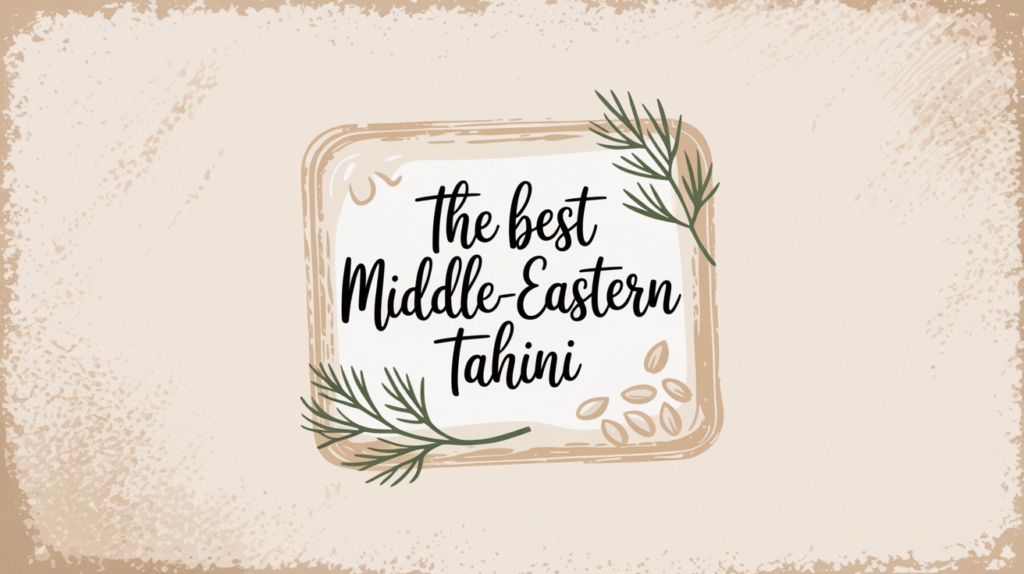The best Middle-Eastern tahini at Sainsbury’s is their Taste the Difference Tahini Paste, which offers a smooth texture and authentic sesame flavour that’s perfect for both traditional recipes and modern plant-based dishes. Made with 100% roasted sesame seeds, it’s a pantry staple that brings rich, nutty depth to savoury meals, dressings, dips, and even desserts.

Here’s a full guide on how Sainsbury’s tahini compares with other brands, its uses, and why it’s ideal for your Middle-Eastern-inspired cooking.
Why Sainsbury’s Tahini Is a Must-Have for Authentic Recipes
Tahini isn’t just a trendy health food—it’s a vital part of many Mediterranean and Middle Eastern dishes, and Sainsbury’s version holds its own.
Made with 100% Sesame Seeds
This tahini contains no additives or preservatives, making it ideal for purists.
- Just one ingredient: roasted sesame seeds
- No added oil, sugar, or salt – a clean label product
Smooth Texture and Deep Flavour
Unlike grainy or overly bitter tahini, Sainsbury’s version is well-balanced.
- Creamy consistency that stirs easily
- Slightly toasted and nutty without overwhelming bitterness
Best Uses for Sainsbury’s Tahini
This versatile paste isn’t just for hummus. You can use it across meals to add richness and creaminess.
Middle-Eastern Classics
These staple recipes rely heavily on high-quality tahini.
- Hummus – Combine with chickpeas, lemon, garlic, and olive oil
- Baba Ganoush – Mix into roasted aubergine for a smoky, creamy dip
- Tahini Sauce – Blend with lemon juice and water to drizzle over falafel, grilled veg, or wraps
Modern and Unexpected Dishes
Tahini’s nutty profile also suits sweet and fusion recipes.
- Tahini Brownies or Cookies – Adds moisture and a rich flavour to baked goods
- Smoothie Boost – Mix a spoonful into banana or date smoothies
- Salad Dressings – Combine with garlic, apple cider vinegar, and maple syrup for a creamy vegan dressing
Nutritional Profile and Health Benefits
Tahini is both nutrient-dense and suitable for a wide range of diets.
Packed with Essential Nutrients
Each spoonful delivers vitamins and minerals.
- High in calcium, iron, magnesium, and healthy fats
- Contains protein – great for vegan and vegetarian diets
Free from Common Allergens
Tahini is naturally gluten-free and dairy-free.
- Safe for coeliacs and people with lactose intolerance
- Suitable for plant-based and Mediterranean-style diets
Storage and Shelf Life
Keeping tahini fresh helps retain its flavour and consistency over time.
Store in a Cool, Dark Cupboard
Avoid refrigeration as it can harden the paste unnecessarily.
- Stir well before use if separation occurs
- Use a clean spoon each time to avoid contamination
Shelf Life Tips
Tahini is stable, but freshness matters.
- Best used within 2–3 months of opening
- Always check the best-before date and smell before use
How It Compares to Other Tahini Brands
Sainsbury’s tahini is cost-effective and high-quality, making it competitive even against specialist brands.
Similar Quality to Imported Options
You don’t have to visit a specialty shop to get good tahini.
- Matches up to brands like Al’Fez, Belazu, or Sunita in smoothness and taste
- Often fresher due to local stocking and turnover
Affordable and Accessible
A solid everyday option for budget-conscious shoppers.
- Lower price than premium imports
- Widely available in-store and online
Who Should Buy Sainsbury’s Tahini?
It’s a strong choice for home cooks looking for quality and convenience.
Ideal for Everyday and Occasional Use
Whether you’re making dips weekly or just want to try something new.
- Great for those exploring Mediterranean cuisine at home
- Also useful for vegans seeking nutrient-rich additions
Beginner-Friendly
Perfect if you’re new to tahini and unsure what to expect.
- Consistent quality and flavour
- Easy to incorporate into a wide range of dishes
FAQs About Sainsbury’s Middle-Eastern Tahini
Here are some questions and answers about Sainsbury’s Middle-Eastern Tahini:
Is Sainsbury’s tahini made from hulled or unhulled sesame seeds?
It’s made from hulled sesame seeds, which gives it a smoother texture and milder taste compared to unhulled varieties that can be slightly bitter.
Is tahini suitable for nut-free diets?
Yes, tahini is made from sesame seeds, not tree nuts. However, sesame is still an allergen, so individuals with sesame allergies should avoid it.
Can I use Sainsbury’s tahini for baking?
Absolutely. It’s great in baked goods like cookies, brownies, and cakes—adding a nutty flavour and creamy texture without dairy or eggs.
Is it safe to eat tahini raw?
Yes, tahini is typically safe to consume without cooking. It’s often used raw in sauces, dressings, and dips.
Does it need to be refrigerated after opening?
Refrigeration isn’t required but may extend freshness. Just make sure the lid is tightly sealed and use a clean spoon to prevent spoilage.
